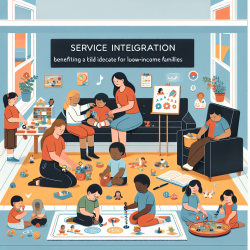Introduction
In the field of speech-language pathology, creating impactful interventions for children from low-income families is a pressing concern. The "Families First Edmonton" (FFE) trial offers valuable insights into how service integration can be a game-changer in this context. This blog post will delve into the findings of the FFE trial, highlighting how practitioners can apply these insights to improve outcomes for children.
The Study: A Brief Overview
The FFE trial was a randomized community-based trial conducted in Edmonton, Canada, from 2006 to 2011. It aimed to evaluate the effectiveness of four service integration approaches in enhancing access to health and social services for low-income families. The trial involved 1168 families who were assigned to one of four groups: Comprehensive service integration, Family Healthy Lifestyle, Family Recreation, or existing services.
Key Findings and Implications
The trial revealed that service integration significantly improved the number of linkages to health and social services. Families in the Comprehensive group, which combined healthy lifestyle and recreation services, showed the highest increase in service linkages. This finding underscores the importance of a holistic approach that addresses multiple facets of family life.
For practitioners, this means that integrating services such as health promotion, education, and recreation can lead to better engagement and outcomes. Here are some actionable steps based on the study's findings:
- Adopt a Holistic Approach: Consider integrating various services that address health, education, and recreation to create a comprehensive support system for families.
- Collaborate with Community Partners: Building partnerships with community organizations can enhance service delivery and ensure that interventions are culturally sensitive and accessible.
- Focus on Capacity Building: Empower families by providing opportunities to build skills and resilience, rather than solely focusing on problem elimination.
Encouraging Further Research
While the FFE trial provides a robust framework for service integration, further research is needed to explore its applicability in different contexts and populations. Practitioners are encouraged to engage in research initiatives that examine the long-term effects of integrated services on child development and family well-being.
Conclusion
The FFE trial offers compelling evidence that service integration can significantly enhance outcomes for children from low-income families. By adopting a holistic, collaborative, and capacity-building approach, practitioners can create meaningful change in the lives of these families. For those interested in delving deeper into the study, the original research paper can be accessed here.










